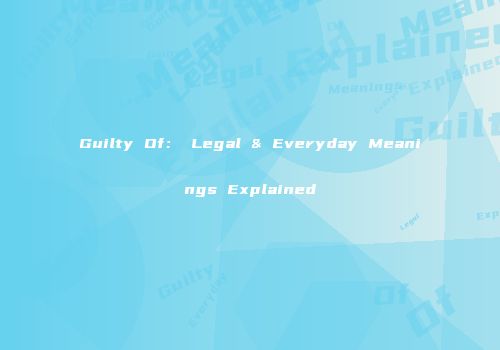摘要:
Understanding "Guilty Of": Meaning, Usage, and Common ScenariosIf you’ve searched for the phrase “guilty of,” you’re lik...
Understanding "Guilty Of": Meaning, Usage, and Common Scenarios
If you’ve searched for the phrase “guilty of,” you’re likely trying to clarify its meaning, legal implications, or proper usage. Here’s a straightforward breakdown to address your questions.
What Does "Guilty Of" Mean?


“Guilty of” describes being responsible for a wrongdoing or violating a rule, law, or moral standard. It’s commonly used in legal contexts but also applies to everyday situations where someone admits fault.
Key Contexts for "Guilty Of"
1.Legal Use

Example: The jury found her guilty of fraud.Here, it signifies a formal judgment in court for a specific crime.2.Everyday Use
Example: He felt guilty of forgetting his friend’s birthday.This expresses personal accountability, even for minor mistakes.Common Phrases and Structures
"Found guilty of": Official legal verdicts (She was found guilty of theft)."Plead guilty to": Admitting to a charge (He pleaded guilty to reckless driving)."Feel guilty of": Emotional acknowledgment of fault (They felt guilty of lying).Avoiding Confusion
Guilty of vs. Guilty for:Use guilty of +specific action (guilty of cheating).Use guilty for +impact on someone (guilty for hurting you).Final Takeaways
Use “guilty of” to assign blame for actions, especially in formal settings.Pair it with nouns or gerunds (guilty of negligence / stealing).In casual speech, it often reflects personal remorse.By mastering these nuances, you’ll apply “guilty of” accurately in writing and conversation.
